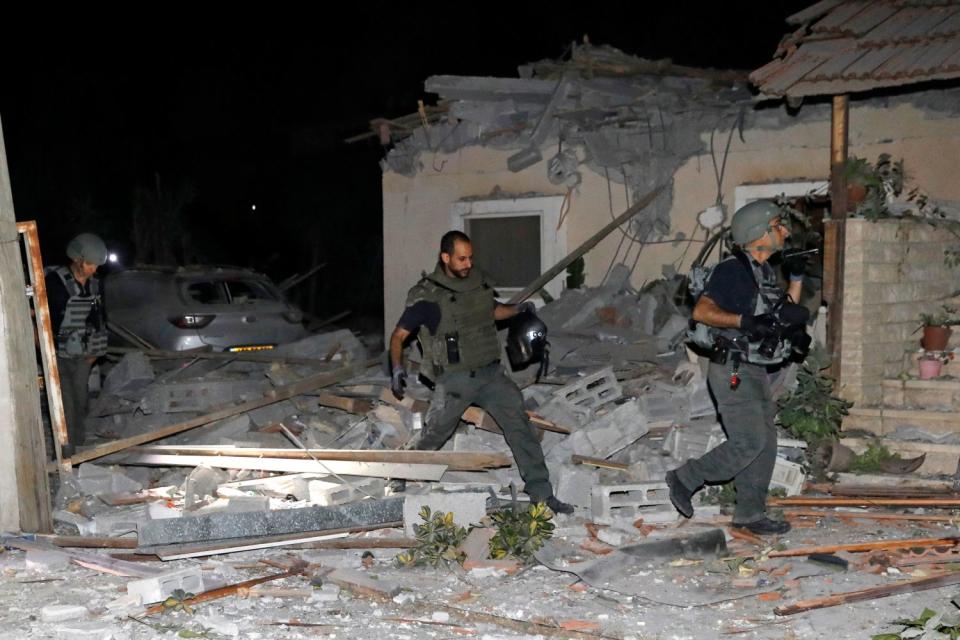Rockets fall and a Tel Aviv family hurries to a bomb shelter

The air raid siren wails in its sudden, ghostly urgency, and in a blur of shoes shoved on and cellphones grabbed, my husband, two children and I hurry down the stairs of our apartment building, joining a trail of neighbors into the communal bomb shelter.
The heavy steel door closes. On a normal day, the shelter is a dusty, windowless 300-square-foot storage space of reinforced concrete crammed with bicycles, scooters and strollers. But normality vanished with unsettling speed as Hamas militants' rockets struck the Jerusalem area Monday, prompting a quick clearing of space inside “in case” the rockets came our way in Tel Aviv.
The first sirens sounded at 8:50 p.m. Tuesday, 10 minutes earlier than Hamas had warned it might strike Israel’s largest metropolis. That’s so uncharacteristic, one neighbor quipped: “In the Middle East people are rarely on time, let alone ever early.”

In all we were about 20 adults and nine children, from babies and toddlers to teenagers, and two dogs, finding our spots either on a beach mat spread out on the concrete floor or on a smattering of chairs. Some neighbors leaned against the wall, rocking little ones in their arms, most of whom had been sleeping when the siren went off.
I hadn’t prepared anything to take with us, such as pillows or even water. At first I (naively) thought we’d be back upstairs again within a few minutes after the Iron Dome missile-defense shield knocked down any rocket that might be overhead. This was Tel Aviv, in central Israel, considered far from the reach of projectiles from Gaza.
But the night had other plans. The sirens continued to wail, faintly from outside our protected walls, and loudly via the Home Front Command app blaring on my husband’s phone. They were followed within moments by the boom of rockets either landing or being knocked out in the sky by the Iron Dome shield.
“That’s a lot of booms,” my son, 11, said, looking visibly shaken. Hamas claims to have shot 130 rockets toward the Tel Aviv metro area — an unprecedented barrage.
Someone took out a Monopoly game and some of the kids started playing. The adults tried to keep things light with nervous jokes. Neighbors swapped news from updates on Twitter and news apps. I thought about all the previous wars and tense times during which I had interviewed families in shelters on the northern border with Lebanon or along the southern border with Gaza, spoken to kids playing cards and other games, and how here I was, becoming part of that scene I had once covered.
My phone is buzzing with texts, local friends and family checking in with a variation of these words: “Are you OK? We are OK.” I sent a group text on WhatsApp to my family in the United States: “Sirens in Tel Aviv but we are fine. In building bomb shelter.”
A neighbor shares a video he’s received — soaring white dots of light in an ink-black sky somewhere over Israel — Hamas rockets and the Iron Dome dueling it out like a real-life video game.

About an hour after hunkering down, some neighbors left the shelter, saying it had been long enough since the last round of sirens. Unlike me they were not novices to wars and waits in bomb shelters. We followed the last of the neighbors out, put our kids to bed with extra kisses, went to sleep in our clothes, only to hear the blare of the app followed by the siren wail just before 3 a.m.
My husband and I climbed out of bed, woke up the kids. My body moved on autopilot, but I swear I could feel my heart drop. We grabbed a bag of supplies this time — water, cups, iPads and our dog, Alfi.
Our previously smiling, joking neighbors stumbled into the shelter with dazed eyes, half-asleep children and, in one case, a 5-year-old who could not be consoled, his hysterical cries of confusion ricocheting off the walls.
Alfi, as expected, barked — loud, long, aggressive. To calm him, my husband scooped Alfi up into his arms, cradling him like the other babies being hushed around us. Eventually calmed, he lay down on the floor and took a nap while the adults and older kids shook off their sleep.
The kids now know to listen for the booms, they try to keep count — five, then seven. No one is sure exactly what we’re hearing anymore — booms or rockets falling. And how close? Eerie silences between bursts. My husband reads information from his app: One was fired toward Holon, another in Ramat Gan, both suburbs of Tel Aviv.
When things quiet down, once again, we don’t know if it’s really OK to go back upstairs. Certainty is no longer in anyone's equation.
“I don’t want to go up only to have to come back downstairs again,” says a mother of two young boys.
Eventually we decide it’s time to go, and the kids settle back into bed, as does my husband. But I can’t sleep. I email a psychologist I know in the United States who specializes in trauma. At 4:41, I tap out a request for techniques to keep calm and just as I drift off, the Home Front Command app blares at my husband’s bedside.
We stumble back down to the shelter.
Kraft is a special correspondent.
This story originally appeared in Los Angeles Times.

 Yahoo Movies
Yahoo Movies 
